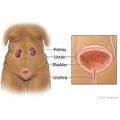Our Health Library information does not replace the advice of a doctor. Please be advised that this information is made available to assist our patients to learn more about their health. Our providers may not see and/or treat all topics found herein.
Urine Culture
Test Overview
A urine culture is a test to find germs (such as bacteria) in the urine that can cause an infection. Bacteria can enter through the urethra and cause a urinary tract infection (UTI).
A sample of urine is added to a substance that promotes the growth of germs. If no germs grow, the culture is negative. If germs grow, the culture is positive. The type of germ may be identified using a microscope or chemical tests.
UTIs are more common in women and girls than in men. This may be partly because the female urethra is shorter and closer to the anus. This allows bacteria from the intestines to come into contact more easily with the urethra. Men also have an antibacterial substance in their prostate gland that lowers their risk.
Why It Is Done
A urine culture may be done to find out if symptoms like pain or burning when urinating are from a urinary tract infection (UTI). The test can also find the cause of a UTI, help determine the best treatment for a UTI, and find out whether the treatment has worked.
How To Prepare
You will need to collect a urine sample. You will need to drink enough fluids and avoid urinating so that you will be able to collect a urine sample.
The first urine of the day is best because bacterial levels will be higher. Avoid urinating just before having this test.
How It Is Done
You may be asked to collect a clean-catch midstream urine sample for testing.
Clean-catch midstream urine collection
This method helps protect the urine sample from germs that are normally found on the penis or vagina.
- Wash your hands before you collect the urine.
- If the collection cup has a lid, remove the lid and set it down with the inner surface up.
- Clean the area around your penis or vagina.
- Start to urinate into the toilet or urinal.
- After the urine has flowed for several seconds, place the collection cup into the urine stream. Collect about 2 ounces (a quarter cup) of this "midstream" urine without stopping the flow of urine.
- Don't touch the rim of the cup to your genital area.
- Finish urinating into the toilet or urinal.
- Carefully replace and tighten the lid on the cup.
- Wash your hands.
Other collection methods
A health professional may collect a urine sample by placing a urinary catheter into the bladder. This method is sometimes used to collect urine from a person in the hospital who is very ill or who can't provide a clean-catch sample. Using a catheter to collect a urine sample reduces the chance of getting bacteria from the skin or genital area in the urine sample.
Collecting a urine sample from a small child or baby may be done by using a special plastic bag with tape around its opening (a U bag). The bag is attached around the child's genitals until the child urinates (usually within an hour). Then the bag is carefully removed. To collect a urine sample from a very sick baby, a doctor may insert a needle through the baby's belly directly into the bladder. (This is called a suprapubic tap.)
How long the test takes
The test will take a few minutes.
How It Feels
This test usually doesn't cause any pain or discomfort.
Risks
There are no known risks from having this test.
Results
Urine culture results are usually ready in 1 to 3 days. But some germs take longer to grow in the culture. So results may not be available for several days.
Urine culture
Normal:
- No bacteria or other germs (such as fungi) grow in the culture. The culture result is negative .
Abnormal:
- Organisms (usually bacteria) grow in the culture. The culture result is positive .
Related Information
Credits
Current as of: September 10, 2024
Author: Ignite Healthwise, LLC Staff
Clinical Review Board
All Ignite Healthwise, LLC education is reviewed by a team that includes physicians, nurses, advanced practitioners, registered dieticians, and other healthcare professionals.
Current as of: September 10, 2024
Author: Ignite Healthwise, LLC Staff
Clinical Review Board
All Ignite Healthwise, LLC education is reviewed by a team that includes physicians, nurses, advanced practitioners, registered dieticians, and other healthcare professionals.
This information does not replace the advice of a doctor. Ignite Healthwise, LLC disclaims any warranty or liability for your use of this information. Your use of this information means that you agree to the Terms of Use and Privacy Policy. Learn how we develop our content.
To learn more about Ignite Healthwise, LLC, visit webmdignite.com.
© 2024-2025 Ignite Healthwise, LLC.






